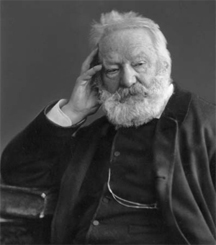Tomorrow at Daybreak
Tomorrow at daybreak, when the fields are pale
I will leave. You see, I know that you wait for me.
I will cross the forest, I will cross the hills
I cannot live far from you any longer.
I will walk, my eyes seeing only mind’s visions
Seeing nothing else, hearing not a sound
Alone, unknown, back bowed, hands crossed
Sad, and the day for me will be like the night
Looking not at the golden night that falls
Nor the sails from far descending on Honfleur
And when I arrive, I will place upon your grave
A wreath of green holly and heather in bloom.
Translated by Valerie Smith
 World Poetry Day or International Poetry Day was celebrated in March 2011. It has long been accepted as a day on which each country will celebrate and reflect upon the poetry of other countries as a means of promoting and popularizing poetry. Many countries have also adopted a National Poetry Day which is different in each country and is dedicated to the reading and performance of the poetry of the nations themselves. The idea is always to promote poetry and increase general knowledge of foreign poets and their works, and this is supposed to carry over throughout the year, the celebration of the ‘Day’ being only a focused stimulus to ensure that interest and consciousness continue. On World Poetry Day it is a practice to introduce the audience to this work so as to increase their knowledge of the poetic product of some other country.
World Poetry Day or International Poetry Day was celebrated in March 2011. It has long been accepted as a day on which each country will celebrate and reflect upon the poetry of other countries as a means of promoting and popularizing poetry. Many countries have also adopted a National Poetry Day which is different in each country and is dedicated to the reading and performance of the poetry of the nations themselves. The idea is always to promote poetry and increase general knowledge of foreign poets and their works, and this is supposed to carry over throughout the year, the celebration of the ‘Day’ being only a focused stimulus to ensure that interest and consciousness continue. On World Poetry Day it is a practice to introduce the audience to this work so as to increase their knowledge of the poetic product of some other country.

It is therefore appropriate this week to offer a brief introduction to the work of a French nineteenth century writer who is a most identifiable representative of France and French poetry. Victor Hugo’s (1802-1885) work is immortal, prevailing in contemporary times through the great attention paid to him in the presentation of his work in other media such as film and the stage. His Hunchback of Notre Dame became a famous film with a notable impact in the cinema. Charles Laughton played the bellringer Quasimodo with Maureen O’Hara as Esmerelda. His Les Miserables (The Miserable Ones) written in 1862 is considered one of the greatest French novels of the nineteenth century. It also became very widely celebrated as a Broadway musical, and was filmed as well in 1995 with Jean-Paul Belmondo and Henri Fortin. In terms of biography there has been modern interest in him and his work, even by extension.
One of his poems that we will feature here is Demain Des L’Aube… (Tomorrow at Dawn (also known as Tomorrow at Daybreak) written about his daughter. But there is another that he wrote about his other younger daughter called A Ma Fille Adele (To My Daughter Adele). He wrote it while she was a baby in the year she was born, 1830, and we find the poet watching over her as she sleeps and creating a poem of metaphysical dimensions, reflecting on youth, time and mortality and the cycle of life, even touching on something of the Romantic. It is this daughter that is the subject of the movie The Story of Adele H, with Isabelle Adjani as Adele Hugo in the lead role.
To My Daughter, Adèle
My baby, sleeping close to me, all pink and fresh,
like a tiny drowsy Jesus in his crèche;
In your innocent sleep, so calm and so charming,
You do not hear the bird singing in the shadows
Pensively, I inhale all the sweet darkness
of the mysterious heavens.
And I listen to the angels flying above your head;
And watch you sleeping; and over your coverlets
Noiselessly, I strip the leaves from jasmine and
carnation;
As I pray, watching over your shuttered eyelids;
My eyes well up full with water, dreaming of things
That await us in the night.
One day, my turn will come to sleep; and my sleep
will be so shadowy, so gloomy, so wild and deep
That I will hear the singing bird no more;
And the night will be black; then, o my dove,
You will return to my tomb,
the tears, prayers and flowers
That I bestrewed by your cradle.
On the fourth of September 1843, Hugo’s other daughter Leopoldine drowned with her husband during a boat ride on the River Seine in Normandy. She was twenty years old and was buried at Ville Quier and the poet planned to cover, on foot, the 35 kilometres from Le Havre to the cemetery as a pilgrimage. This is what he writes about in the poem Demain Des L’Aube… (Tomorrow at Dawn).




